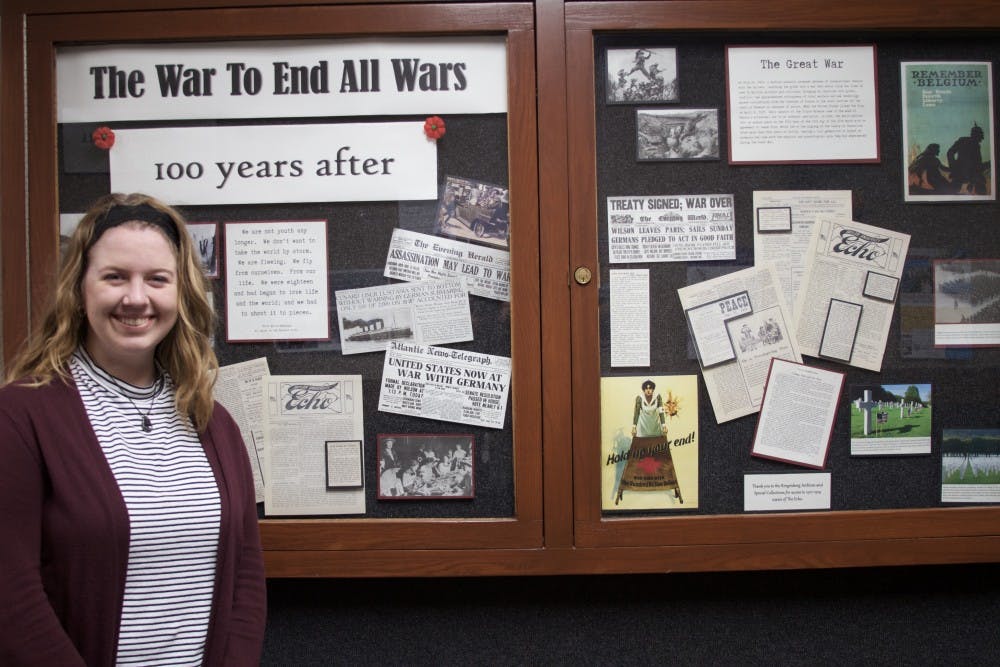By Abigail Roberts | Echo
Sunday, Nov. 11, 2018 will mark 100 years since the end of WWI. Partnering together, five Taylor academic departments present a memorial weekend, Nov. 8-11 dedicated to the remembering of WWI.
"We are a liberal arts school and this is the liberal arts coming together to mark the occasion," said Leon Harshenin, professor of music.
The idea of somehow commemorating the armistice had been bouncing around in the heads of multiple faculty for several years. Harshenin, as well, had been thinking about this event and practicing a moving WWI-linked piano piece for a couple years.
Largely pushed by Hammond and faculty from the English, Bible, music, theater, arts,history and political science departments faculty began planning the event under the guidance of History department chair, Tom Jones.
"It is very exciting to see the university come together to honor this event," said Ben Wetzel, assistant professor of history.
According to Wetzel, if one wants to understand the modern world, it is necessary to go back to the great wars. WWI gets lost in the shadow of WWII, but WWI was just as traumatic for its generation.
The summer of 1914, in June, the assassination of an Austro-Hungarian prince triggered prior alliances, and by August, WWI became global. Although primarily a European war, there was fighting on almost every continent.
In 1917, everything changed when the U.S. entered the war. By the end of 1918, Allies marched across Europe and Axis powers began signing peace treaties; Turkey signed by the end of October and the Austro-Hungarians by Nov. 3.
5 a.m. Nov. 11, 1918, in a dark, damp railroad car, a German delegation headed by German Matthias Erzberger, leaned over a faded paper, pen in hand. Faced with allied powers at their borders and little remaining manpower, Matthias signed the sheet of paper which would change the fate of the entire war, the WWI Armistice.
Taylor's upcoming weekend of remembrance commemorates not only the signing of the Nov. 11 peace treaty, but also all of those who died amidst this tragic conflict.
On Nov. 8, at 7:30 p.m. Harshenin and Chris Bade, music department co-chair, will be presenting a musical recital accompanied by selected poetry in the Recital Hall. Readings will be performed by Dan Bowman, associate professor of English and Aaron Housholder, assistant professor of English.
"It is important to mark the end of that tragic war and remember those who died," Harshenin said. "It is a once in a lifetime opportunity to celebrate the centennial. It's a part of the student's past history as well."'
On Friday, Nov. 9 at 4 p.m., in conjunction with Taylor's weekly C.S. Lewis and friends meeting, Ben Wetzel, assistant professor of history, will be presenting two chapters from his master's thesis in Ayers 215. His presentation covers specifically what mainline Protestants thought about the war in contrast to the contemporary Lutheran views.
According to Wetzel, Protestants supported the war on a religious level. In his presentation, Wetzel will use this to question if the is a way to hate your enemies while being rooted in faith.
Friday's events will also include a showing of the French award-winning film "Joyeux Noël" at 7 p.m. in Cornwall Auditorium.
Ed Meadors, professor of Biblical Studies, on Saturday Nov. 10 will be leading a time of prayer in the Memorial Prayer chapel
According to Jones, the chapel will be not to just remember ending the war, but also to remember the impact it had on everyone.
To conclude the weekend, a final remembrance service will be held in the Euler Atrium at 7 p.m.
"It will be poignant and autumnal," Harshenin said. "In the sense of causing us to remember with a mixture of beauty and sadness, a mixture of bittersweet sentiment."





